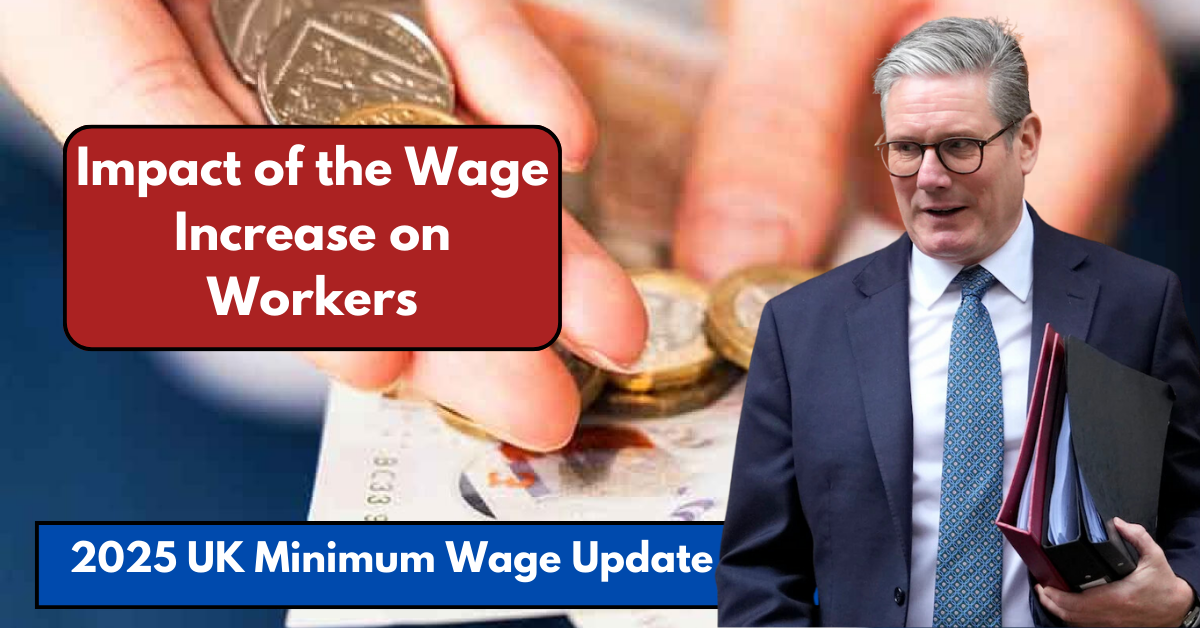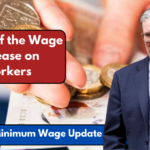The UK government has introduced notable changes to the National Minimum Wage (NMW) and National Living Wage (NLW), which will take effect on April 1, 2025. These updates aim to enhance financial security for workers and challenge employers to adapt to rising costs. Whether you are an employee excited about better pay or an employer preparing for increased expenses, it’s crucial to understand the details and implications of these changes.
Key Updates on Minimum Wage Rates
The table below highlights the updated wage rates:
| Category | New Hourly Rate | Previous Rate (April 2024) | Increase (£) | Increase (%) |
|---|---|---|---|---|
| National Living Wage (21+) | £12.21 | £11.44 | £0.77 | 6.7% |
| 18-20 Year Olds | £10.00 | £8.60 | £1.40 | 16.3% |
| 16-17 Year Olds | £7.55 | £6.40 | £1.15 | 18.0% |
| Apprentice Rate | £7.55 | £6.40 | £1.15 | 18.0% |
| Accommodation Offset | £10.66 | £9.99 | £0.67 | 6.7% |
Impact of the Wage Increase on Workers

1. Enhanced Financial Security
The increased rates mean better pay for over three million workers across the UK, offering more disposable income to handle everyday expenses and savings.
Example: A full-time employee working 37.5 hours per week at the new NLW rate of £12.21 will earn approximately £457.88 per week, compared to £428.25 under the previous rate—a weekly increase of £29.63.
Practical Tip: Consider using the additional income to build an emergency fund or invest in skill development.
2. Fairer Pay for Younger Workers
Younger workers and apprentices benefit from significant percentage increases, promoting workplace equity and better earning potential.
Example: An 18-year-old working 20 hours weekly will now earn £200, up from £172—a clear boost in income.
3. Improved Workplace Equality
The pay hikes for younger age groups narrow the wage gap, ensuring fairness and inclusivity. For apprentices, the increase makes vocational training more financially attractive, particularly in sectors like engineering and construction.
What This Means for Employers?

While these changes benefit workers, businesses must navigate the challenges of higher wage bills. Here’s how employers can prepare:
1. Reevaluate Budgets
Employers should update their financial plans to account for increased labor costs. Identifying cost-saving measures can offset these expenses without compromising quality or employee satisfaction.
Actionable Advice: Conduct a wage impact analysis and implement automated payroll systems for accuracy and compliance.
2. Focus on Operational Efficiency
Streamlining processes can help businesses make the most of labor hours, reducing waste and boosting productivity.
Example: Retailers could adopt self-checkout kiosks, while restaurants might integrate digital ordering systems.
3. Invest in Upskilling Staff
Higher wages should coincide with higher productivity. Training and upskilling employees can lead to better performance and a more committed workforce.
Outcome: A skilled team reduces turnover, saves recruitment costs, and fosters a positive work environment.
4. Communicate Transparently
Keep employees informed about wage changes and explain how they align with the company’s vision. Transparency builds trust and smoothens transitions.
Why These Changes Matter?

The 2025 updates address rising living costs while improving workplace equity. Higher wages can:
- Boost employee morale and retention.
- Enhance living standards for millions of workers.
- Challenge businesses to innovate and adapt.
How to Make the Most of These Changes
For Workers:
- Regularly check your pay stubs to ensure compliance with the updated rates.
- Use additional earnings to plan for future financial security.
For Employers:
- Prioritize strategic planning to absorb higher wage costs.
- Embrace innovation and training to stay competitive in the evolving economic landscape.
Conclusion
The 2025 UK Minimum Wage Update represents a significant step toward fairer pay and a more inclusive workplace. By understanding these changes and taking proactive steps, both workers and employers can thrive in this new economic chapter.
This article has been carefully fact-checked by our editorial team to ensure accuracy and eliminate any misleading information. We are committed to maintaining the highest standards of integrity in our content.
Premlata is a seasoned finance writer with a keen eye for unraveling complex global financial systems. From government benefits to energy rebates and recruitment trends, she empowers readers with actionable insights and clarity. When she’s not crafting impactful articles, you can find her sharing her expertise on LinkedIn or connecting via email at biswaspremlata@gmail.com.









